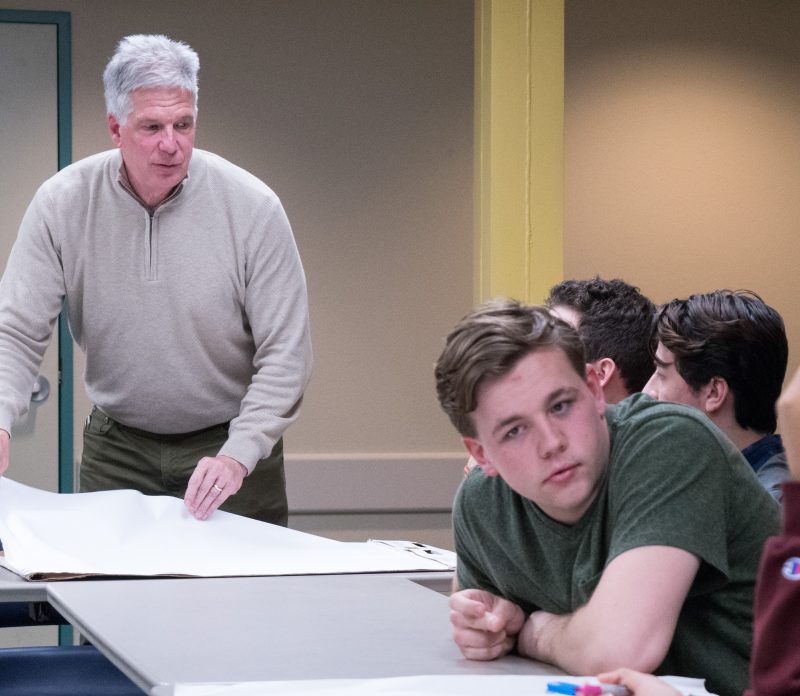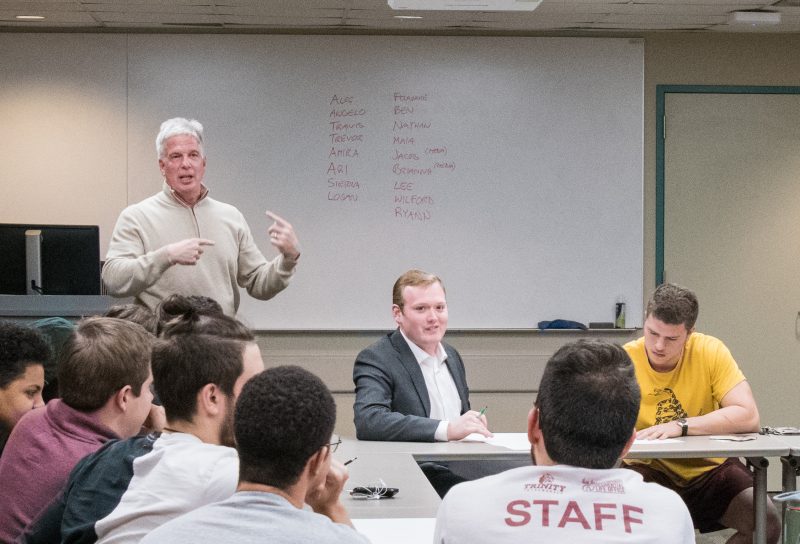It’s commonly believed that most Trinity students lean liberal. But at Dean of Students David Tuttle’s March 28 discussion “Being Right: Living — and Living with — the Conservative Viewpoint on the Trinity Campus,” only two of the 16 students attending identified as conservative.
“I really expected there’d be more of you,” Tuttle joked at the beginning of the discussion.
The low number of the conservative students spoke to the likewise low number of right-wing students willing to share and discuss their views on campus, even in what should have been a peaceful environment.
The “Being Right” discussion revolved around what the conservative viewpoint at Trinity actually is and what conservative students face as a result of being the minority political group on campus. The idea for the meeting came after Dean Tuttle noticed that conservative students were often forced to defend their viewpoints when in discussions where a liberal viewpoint was assumed, like at the previous “Speaking Of” discussion titled “Colin Kaepernick, Race, Sports, and the National Anthem.”
Sophomore Isaiah Mitchell, upcoming president of the conservative student group, Tigers for Liberty (TFL), spoke to the response that TFL has received on campus.
“There’s sort of an underlying assumption that we’re the bad guys,” Mitchell said. “And by that, I don’t just mean that what we believe is bad; I mean that there’s sort of an underlying assumption that anything which is bad can fit under the label of conservatism, of what we believe, regardless of, you know, any ideological friction that it might have.”
First-year TFL officer Maddie D’Iorio feels that fellow students see her differently because she has publicly expressed certain views.
“There have been a lot of things said behind my back,” D’Iorio said. “There are people I’ve met who already have preconceived notions of me just because of an article I’ve written for the Trinitionian, or certain things I’ve said in SGA [meetings].”
One Democrat who attended the event, Ben Brody, acknowledged this viewpoint.
“I’ve always had that assumption that if you’re incredibly conservative, you’re probably mean,” Brody said.

However, even during the event it was apparent that many of the attendant’s views on conservatism had changed.
“I think immediately after the event, I viewed them as people — as human, caring people. Not as the ‘conservatives on campus,’ not as Tigers for Liberty, but as genuine, empathetic people,” Brody said.
Sophomore Logan Felton also gained a new perspective.
“It makes me really sad to hear that there are people on campus who don’t feel comfortable here because of their political beliefs,” Felton said.
Discussions like these can humanize the conservative ideological minority on campus while also bringing a greater understanding to their views. For instance, one thing that all of the attendants of the session had in common was a disapproval for our current president.
“I don’t even really have to explain why. Just, no. A flat no,” Mitchell said when asked if he approved of Trump. The other conservative in attendance, Manfred Wendt, agreed. (Wendt is an opinion columnist for the Trinitonian.)
Despite some similar views, there was some tension during the meeting due to opposing viewpoints. Liberals in attendance questioned numerous conservative viewpoints, such as positions on free speech and its relation to religious beliefs.
Yet there was not a single person, liberal or conservative, who did not remain polite and peaceful during the discussion, even during disagreements.
“Political belief and personality don’t have to be the same thing,” Brody said. “I want to encourage people to talk to [conservatives]. If, like me, in the past, you’ve heard something bad, before definitively passing a judgement, give them a chance to explain themselves. Go in open-minded, be willing to hear them out. … Assumptions are going to be the death of us if we don’t figure out how to communicate.”
D’Iorio emphasized that she does not need people to agree with her; she simply wants peers to respect her views.
“Get to know people who have different political views than your own. I think we can be friends with people who we don’t agree with on certain issues,” D’Iorio said.
In the end, that’s what every end of the political spectrum wants on campus — to be heard and understood, not judged or dismissed because of their beliefs.
“My goal is for conservative thought to be less shocking and unexpected,” Mitchell said. “The more that my peers have learned about my beliefs, the more such explicit loathing has been replaced by a tense politeness.”
The conservative and liberal students agreed on the goal of creating as diverse and accommodating a campus community as possible.
“We’re all 19, 20-year-olds who deserve to feel at home at a place we’re paying thousands of dollars a year to be at,” Felton said.







